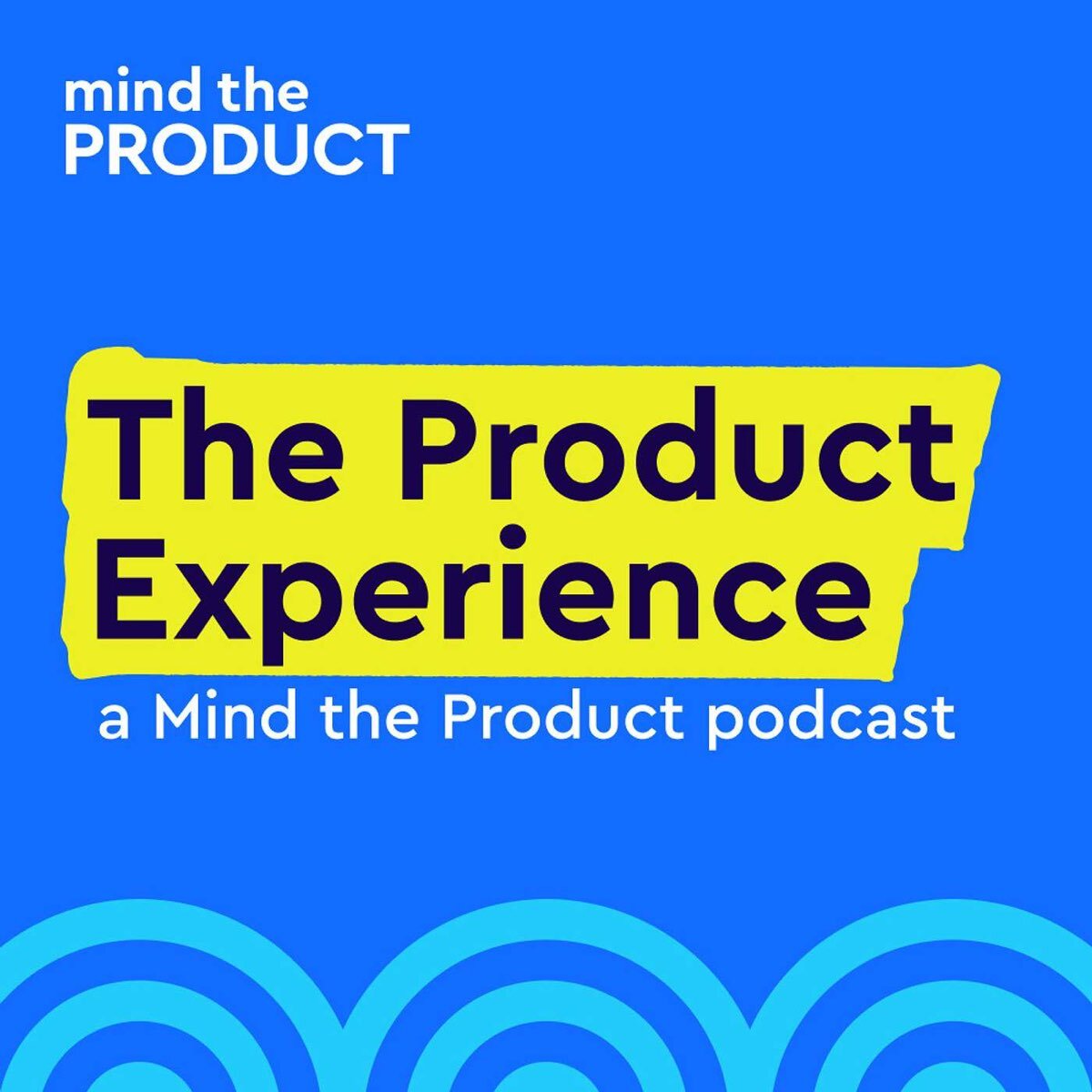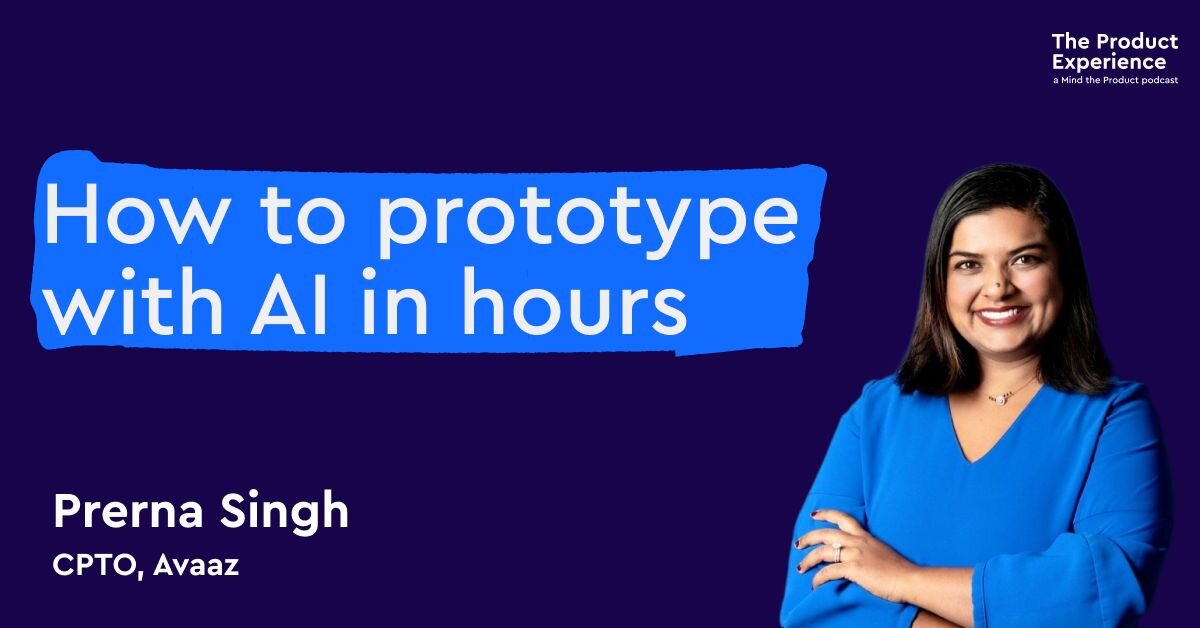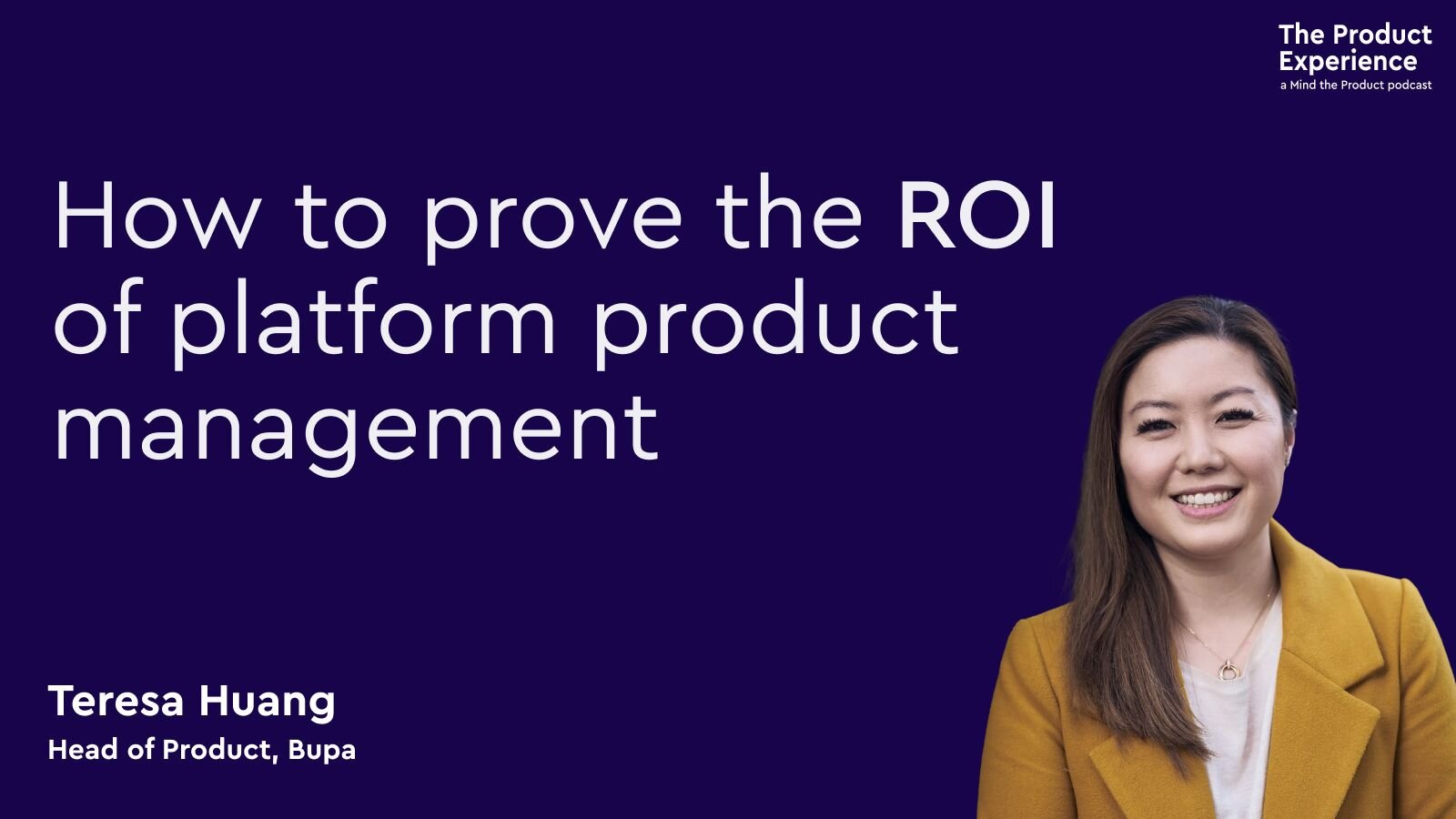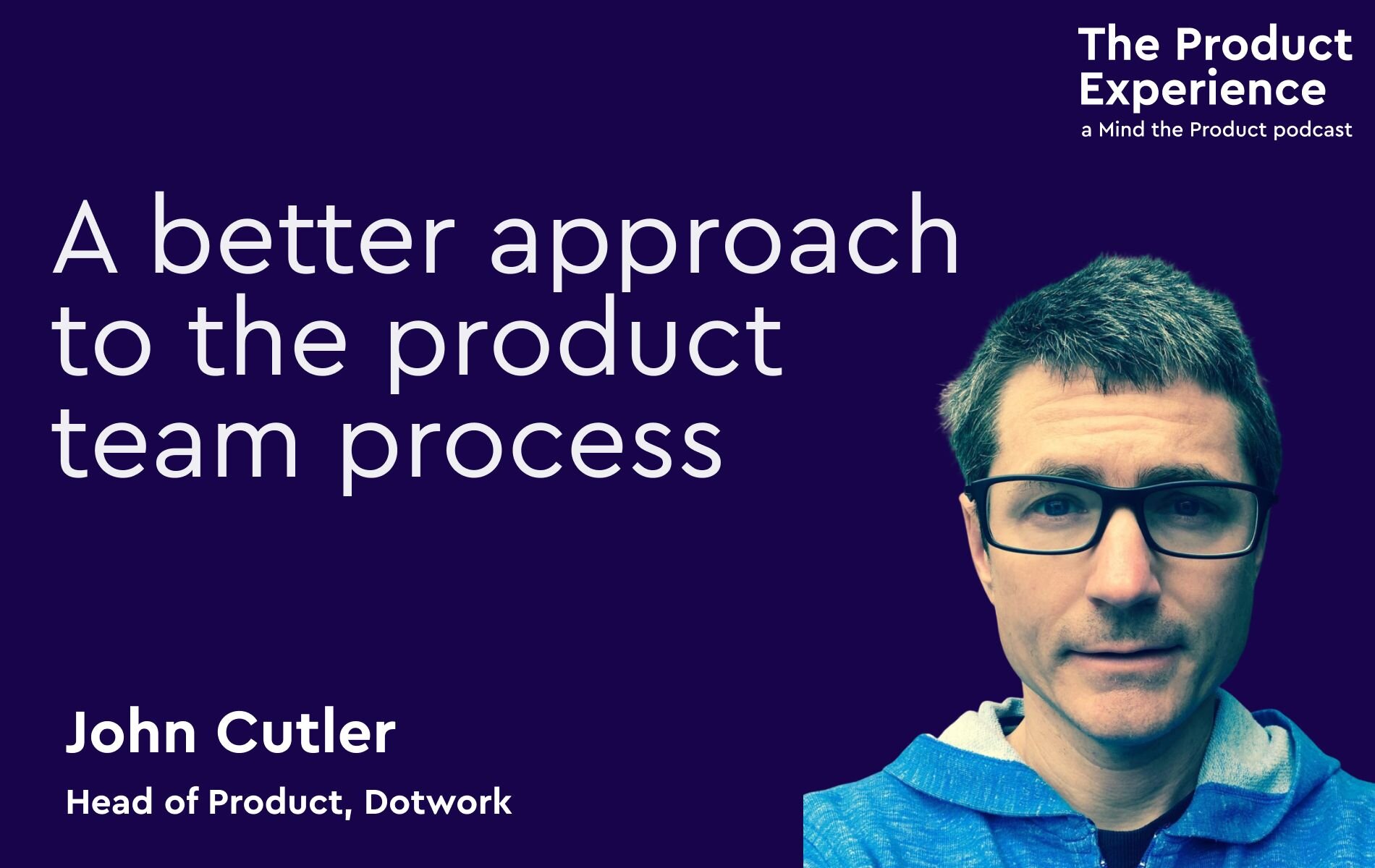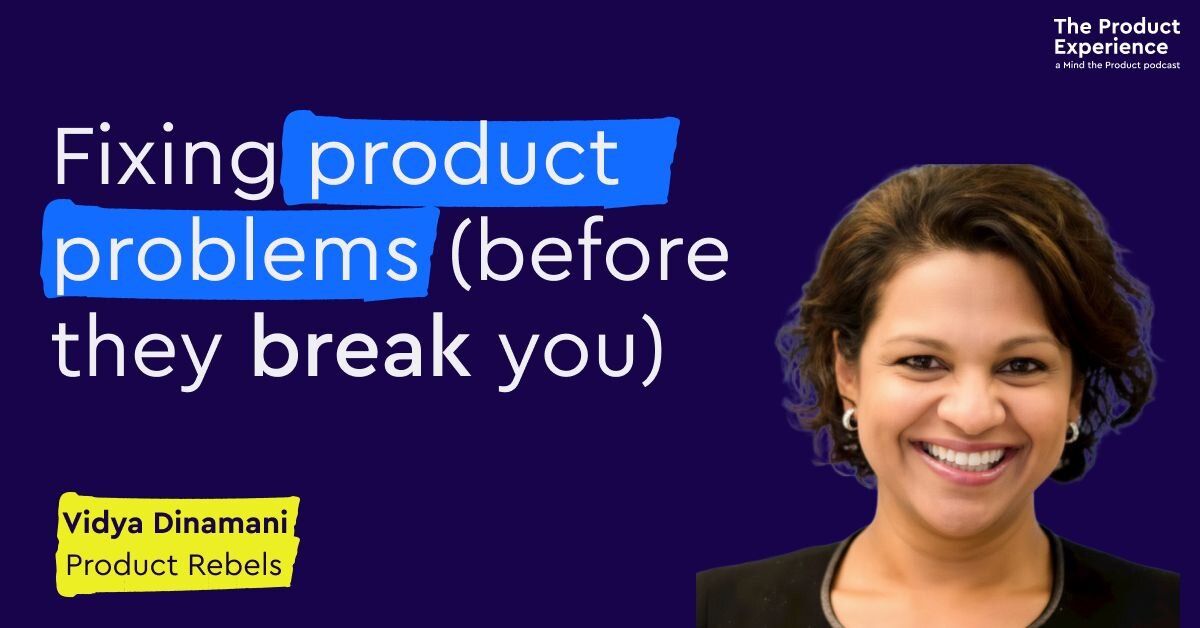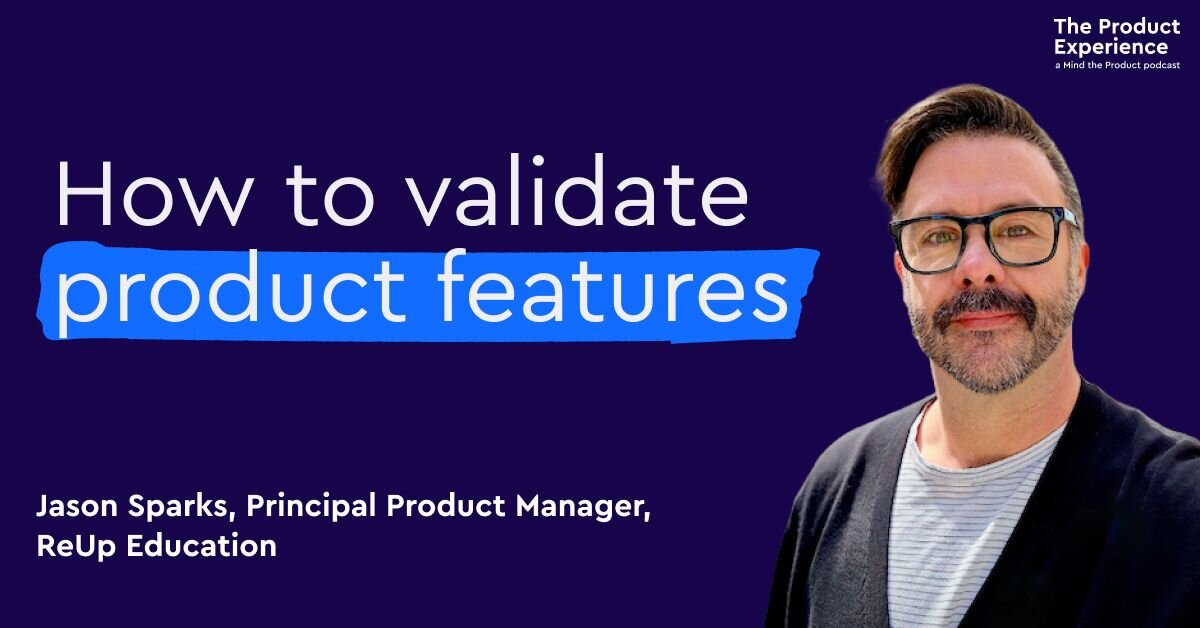Burnout is a silent adversary that many of us face. This week, we're joined by Evie Brockwell, a seasoned product consultant and coach who has faced this challenge head-on during her time at Booking.com. We unpack why burnout is alarmingly prevalent among product professionals and explore practical strategies for prevention and recovery, emphasising the importance of wellbeing in our professional lives.
Key takeaways
Burnout is prevalent in product management, with 92% experiencing it.
Defining burnout includes exhaustion and negativity towards work.
Personal pressure and organizational culture are key factors in burnout.
Awareness and open conversations are crucial for addressing burnout.
Long hours do not necessarily lead to burnout; recognition matters more.
Women and men experience burnout at similar rates.
Creating clarity in roles can help reduce burnout.
Supportive leadership can mitigate burnout in teams.
Identifying stress triggers is essential for personal management.
Practicing self-care and setting boundaries is vital for well-being.
Chapters
- 00:00 Understanding Burnout in Product Management
- 02:47 Defining Burnout: Symptoms and Causes
- 05:55 The Unique Challenges of Product Roles
- 09:11 The Data Behind Burnout in Product Management
- 12:03 Organizational Factors Contributing to Burnout
- 14:49 Strategies for Individuals and Leaders
- 18:10 Myths and Misconceptions About Burnout
- 20:56 The Role of Perspective in Managing Stress
- 23:46 Building Awareness and Support Systems
- 27:05 Final Thoughts on Preventing Burnout
Episode Transcript
Randy Silver: 0:00
Hey, it's the Product Experience Podcast. I'm Randy Silver and I'm exhausted Now. That's just because I'm a bit jet-lagged, but too many product people that Lily and I talk to are just plain tired because of overwork and stress. So this week we're excited to chat with Evie Brockwell about both preventing and overcoming burnout. We've talked about this topic in the past, but it's too important not to revisit. Make avoiding burnout for you and your team one of your resolutions for the year.
Lily Smith: 0:34
The Product Experience Podcast is brought to you by Mind, the Product part of the Pendo family. Every week we talk to inspiring product people from around the globe.
Randy Silver: 0:43
Visit mindtheproductcom to catch up on past episodes and discover free resources to help you with your product practice. Learn about Mind, the Product's conferences and their great training opportunities.
Lily Smith: 0:56
Create a free account to get product inspiration delivered weekly to your inbox. Mind, the Product supports over 200 product tank meetups from New York to Barcelona. There's probably one near you. Hi, Evie, Welcome to the product experience. Hello, and thank you for having me. So we are going to talk about burnout today, which feels quite timely because both Randy and I are feeling quite tired I've just been in bed for two and a half hours and he's just recovering from a long haul flight but also we shouldn't diminish the actual you know real experience of burnout. But yeah, just topical for today because of the tiredness.
Evie Brockwell: 1:43
And it's January. I feel you January. Yeah, I feel you January. Yeah, I'm in hibernation mode. Everyone's like how do you survive? I'm like I literally sleep for nine hours every night, like that's how I survive. I know, right, that sounds like bliss.
Lily Smith: 1:57
Yeah, and I'm just getting up at 5am no.
Evie Brockwell: 2:03
No, I'm not about that life. Whoever said that?
Lily Smith: 2:05
is wrong. So before we get stuck right into the topic, it'd be great if you could give our listeners a quick intro to who you are and your background in product.
Evie Brockwell: 2:14
Yeah, so I'm a product consultant and coach, but I spent four years growing the craft at bookingcom and I worked in product prior to that as well, so I've got a large amount of corporate experience and I've spent the last three years working with a variety of large corporate clients and scale ups and also coaching over 70 product people to become really good at product. So I've seen a whole scheme of things in terms of what makes product great, and I know this will feed into some of your questions, but I've also seen the reasons that people come to me for coaching, and so much of that has been around things like burnout and trying to make sure that you can really do a great job in product while still taking care of yourself.
Lily Smith: 2:54
And I guess, yeah, that was going to be my first question of, like you know why this topic, Like, why are we talking about burnout tonight and what's your sort of experience with it?
Evie Brockwell: 3:05
Yeah. So I think it's a topic that's really started to gain traction over the last year, and the reason why I started digging into it was because I found about 50% of the people that were coming to me for coaching were saying, hey, like I'm really struggling, though I've already burnt out and I don't want to burn out again, but I still want to do really well in my career, or I'm currently going through burnout and I don't know what to do about it. I don't know. I don't know why they came to me, but I kind of do, because I always spoke a little bit about the mental health space and it really made me stop and question and go wait.
Evie Brockwell: 3:36
If I've got this many people asking me for coaching because they've experienced this and surely either that number's crazily high or there's something bigger going on here that people just haven't been talking about. So in February last year I decided to do a whole bunch of research and really try to get to the bottom of how many people are actually experiencing burnout and what are the main reasons why it happens in product management, because the numbers seem to be way higher in product than it's high in tech. But it seems to be higher in product than it's high in tech but it seems to be higher in product than even engineering, ux or anything else.
Evie Brockwell: 4:08
so, yeah, that's what took me down that path and then, kind of to coincide with that, also when I worked at bookingcom, one of the main reasons for me deciding to leave and to work for myself was that I'd been through the burnout experience there. I wanted to really try to reset my life and create that balance and assess what good looked like to me, and I can safely say, like three years later, that I feel like I figured that out and I also have now worked out the reasons why other people are going through it. So there are ways that you can overcome this and make the product world better, but it's not always the most straightforward thing.
Randy Silver: 4:46
Evie, can we start with the definition actually, because I feel like we use the word burnout a lot and people mean different things from it. So can you be more specific? What is burnout?
Evie Brockwell: 4:56
Yeah, of course. So I say of course and then I'm like but here's a caveat, because the real definition that we have comes from the World Health Organization and they basically have four areas that they talk about. So it's things like feeling negative towards your job, feeling exhausted from work, and they're the kind of symptoms. But they also state that it's only a workplace based thing. But actually when you speak to a lot of the experts, that's not strictly true and I know a lot of people that have been going through the job search and they've burnt out just looking for jobs. So it's not like you only get burnt out if you have a quote-unquote nine to five, but a lot of the symptoms are to do with the fact that you will feel exhausted from your job or you'll feel negative towards your job. So that's the main definition that I used when I was doing my research.
Lily Smith: 5:46
I guess there are levels of that as well. Like you know, everyone can have a bit of a bad day, but I feel like there's a tipping point at which, like that exhaustion or that negativity becomes more prolonged or more like a stronger sort of sense of that feeling, would you say.
Evie Brockwell: 6:06
Yeah, I would, and, like the way that I phrased all of my questions, was if you've been experiencing these kind of symptoms for three months or more, because three months feels like a long enough time where it's not just a phase, it's not just a busy quarter, it's more permanent and, realistically, I think people can cope with a lot of these symptoms, from anything from like six months up to a year. It's only really when you get past that point that you do kind of reach that tipping point of being so burnt out that it's gone too far. But I think it's important to talk about feeling that way a lot earlier so that you don't get to that point of kind of no return.
Randy Silver: 6:46
We talk about product people as being special a lot, or product people like to talk about themselves as being special a lot. Is burnout something that is especially endemic to product people, or is it just the nature of the world and work in the current times?
Evie Brockwell: 7:03
It's because we are specialandy, I'm like don't let anyone tell you otherwise but it's basically a mix of both. So the biggest findings that I gained from this research and from all of the conversations I've had since are there are two main factors. You've got the personal side of things, which this reigns so true for so many product people, where there's a lot of high achievers, a lot of perfectionists, a lot of people that have always done really well for themselves at school and you'll see it because we advertise for like thriving in a fast-paced environment. So you're attracting the kind of people that really want to operate as these standalone people that are going to solve all of the problems. So you do have that side of personality types. And then you also have the nature of the product role, which is it is super fast paced.
Evie Brockwell: 7:54
You're either in a startup where you need to make sure that you start making money and find product market fit, or you're in a large corporate and you've got OKRs that are changing every three months and you're constantly driving change, as well as the nature of always needing to make decisions, constantly, context switching, like both of those things are really exhausting on our mental load and extra bits like you always need to influence people and you have no direct control, so it's not the kind of job that you can just turn up to and go. Oh, I don't really fancy pushing this week, I'm just going to take it easy. So the combination of both of those things really mean that this is kind of a unique environment for people to operate in.
Lily Smith: 8:36
And let's touch on some of the data from, because I love a bit of you know data and you've got some. I was going to say some great numbers, but actually they're terrible numbers.
Evie Brockwell: 8:46
Yeah, it's great because it means that we can start to drive change, but it is quite shocking. So the main things that I found were that 92% of people had either burnt out or had been on the verge of this, and obviously this is self-diagnosed, so it's what we were talking about before is to like, when do you really say you've burnt out, slash, you've just been really stressed. But if 92% of people are saying that they felt that way, that's still crazily high. 72% of people had felt that way more than once.
Evie Brockwell: 9:16
So even when they change jobs, switch environments, taking a break, that still hasn't solved the problem. So we still keep falling back into those same patterns, which is really important. And going back to the definition point that you mentioned, randy, when I actually asked the question on how many people had experienced the symptoms, from the world health organization definition, that was 99 of product people. So there's still a bunch of people that are like, oh, but I'm still fine, so the numbers are really high. Yeah, I can dive into a lot more statistics, but they're the high level ones.
Lily Smith: 9:48
And it was 92% of people in product that have burnt out or been on the verge. So it does seem to be very it'd be really interesting to actually do that research in other trades. And one of the other things that I thought was really interesting from your data as well, that 43% of people in product believe this is a taboo topic, which I think was from a different report. But like, why do you think people find it to be taboo?
Evie Brockwell: 10:14
Yeah. So the product academy also ran some research earlier this year and that was one of their biggest findings. And from when I've spoken to a lot of people and this was certainly the experience myself I genuinely felt like it was just me. I felt like I wasn't able to do my job effectively. So I didn't really want to say like, oh, I'm feeling burnt out, because I felt like that was me, saying that I was struggling and couldn't cope with the responsibilities at that level. That level and I think so many people feel like that they feel like it's on them to be able to be quote unquote stronger or to do a better job, as opposed to just saying, actually, this is the nature of the industry and the role. We should be trying to change the way that we operate.
Randy Silver: 10:57
Evie, now that you are not in the role day to day and you're advising, I find that when I've been in leadership positions or when I come in as an advisor and consultant, I can see this in individuals and see it way too often. And your numbers I can totally back them up. But do you see it only as an individual thing? Or sometimes do you see entire teams being burnt out as well or showing the symptoms of that?
Evie Brockwell: 11:22
Yeah, I mean, I see both. So sometimes you get entire teams and it's usually they're more of a symptom of the organization or the pressure that that team is under. But also one of the side effects I'm going to say of burnout that people don't typically talk about is that if one person's starting to feel that way in the team not that it spreads burnout necessarily, but it kind of spreads that negative sentiment or that feeling of stress or that feeling of overwhelm so it can be a bit of both that one person might start with it and it might get worse, or it could just be that and this is one of the other statistics was that 63% of people said that they'd worked in toxic environments. So that number is also extremely high and it does show that we obviously have a lot of product teams that are operating in more of this like toxic space, and that's not unique to just one person.
Randy Silver: 12:14
Is that the primary driver? Is it toxic space? Is it uncertainty? What are the real underlying factors for this?
Evie Brockwell: 12:22
Yeah, so the biggest one is actually from the personal factor side of things, where people are putting so much pressure on themselves to be able to do a good job and to perform. Then there's also the organizational side of the pressure, which was 80% of people. So they were the two main ones. And then the next one beyond that is the toxic and unsupported boss side of things and psychological safety. Like, I tie all of those things together when I talk about it because I think they're all relevant in the same space.
Evie Brockwell: 12:52
And then some of the other factors are things like ambiguity in the role or ambiguity of responsibilities. So what am I responsible for versus my engineering lead or versus another product person? Or should I be doing this thing? Is that at my level or is that at a level below? So creating some more clarity can really help people. Then you've got level of meetings, context switching and all of these other factors, but they all very much aren't. They're a lot more spread when it comes down to the data. So the main ones are still the pressure and the toxic environments.
Randy Silver: 13:28
With everything you're talking about there, from pressure. Whose responsibility is it to sort that out? A lot of those things come back to certainty. Certainty about role, certainty about how well you're doing, a certainty about what you're trying to do. Is that your job? Is that your boss's job? Where does this go?
Evie Brockwell: 13:46
Yeah. So ideally it would be your boss's job, but in most scenarios, obviously, if your boss hasn't done that already, if you're the one feeling that pressure, if you're the one feeling that way, then it's always that self-accountability to say, okay, what can I change, what can I try and drive forwards. That's easier in these environments where it's not toxic. So if you just are looking at your own role and saying, actually, I've got too much work on, or these are the things that are stressing me out, or I don't feel like I have clarity in this space, then the more you can take it upon yourself to try and create that clarity, which often people start by going to their boss and saying like, hey, I want some more clarity in this space, and then they don't get it.
Evie Brockwell: 14:25
But if you go to your boss with a proposal to say, hey, I think this is what my scope should be and this is what I think should sit somewhere else, then it's far easier for someone else to give you a yes or a no. So if you need to start with yourself, start in those kind of directions. Obviously, if you're working in a more toxic environment, it's not necessarily as easy to go and have those conversations. So there's still more advice that, like, I share and give to people in that space, which is work out what you can control. Also work out if there's someone else you can speak to, if you don't feel like it's your boss, and there's so much more we could go into in that space, but there are things that you can start to try and think about.
Randy Silver: 15:03
I can't tell you how many times I've given people the advice of, you know, the serenity prayer. I'm not a religious person, but when you think about the things you can control and the things you can't control, and the grace to, to accept and yeah, yeah, and sometimes it's easier said than done.
Evie Brockwell: 15:17
Like I think we can just say it to people and it's like okay, great, but you still feel frustrated by these things and you need like more exercises or more practice or more tools to be able to do that effectively.
Lily Smith: 15:27
But like that is the key principle and the key starting point that people should be aware of have you experienced any examples of companies or people who have kind of managed this really well, you know, been able to identify that this is like a road that they're going down and sort of like pull themselves out of it quite quickly?
Evie Brockwell: 15:48
Yeah. So the three different scenarios that I could talk about in that space are I've spoken to some product leaders that have led their teams in a really good way and, as a product leader, the things that you can do is to have those kind of weekly check-ins as a team where you talk about how is everyone feeling and genuinely try to understand and get that gauge and create that safe space for people to talk about it and proactively support them to overcome it. So they're the product leaders that have done really well, even in terms of helping people clear up meetings, set their priorities, create that clarity. You can do so many things and be in such a great position to help create that kind of environment. There's also been like more organizational based things, which have been harder to find. It's really hard to find product organizations that are doing this really well, but the ones that I've spoken to and the people that have worked in them that have have been deemed to be the best are ones that like truly support flexible working, that understand that you've got other things going on in your life, that set realistic targets, that listen to feedback and have those two-way conversations. So again, that's still like leadership level driven things, but it's wider than just doing in your team. And then for individuals, it's people that have been able to go okay, I can work out what I'm in control of or what I'm not, or they've been able to work out. Hey, here are all of the things that are causing me stress and chaos. That may break that down into a plan that I can actually execute on that will improve things and have been able to try and drive and shape their environments and where they've not been able to ignore some of that stuff.
Evie Brockwell: 17:24
The other big thing on the personal side of it is that people often hear these strategies or hear these things and think, oh, that won't work in my environment. Or they try and implement something and then, like I've heard this so many times like, oh well, I started setting boundaries and then I had a conversation with someone and then I just felt like I needed to do it anyway and they've not been able to follow through on that. Yeah, we've all been there. It's like you have to really know your why and get really strong and unpick a lot of the beliefs that you've had around. What makes you successful? We're often people pleasers. We often want to impress everyone and to do a really good job. And practicing like truly saying no and still knowing you're having a positive impact and prioritizing the right things so that you do drive the right change. That takes a fair amount of practice and discipline.
Randy Silver: 18:24
Product people. Are you ready? The word on the street is true. Mtp Con London is back in 2025. We're very excited for Minded Products's return to the Barbican next March.
Lily Smith: 18:37
Whenever I hear people talking about the best product conferences, Mind the Product is always top of the list. If you've been before, you know what's in store. Oh, that rhymes. New insights, strategies, hands-on learnings from the absolute best in the field, plus great networking opportunities. And if you're joining us for the first time, I promise you won't be disappointed.
Randy Silver: 18:59
We've got one speaker already announced. That's Leah Tarrin, who you've heard on this very podcast. With more to come. From the likes of WhatsApp, the Financial Times and Google, you know real people working in the field who will share real actionable insights to level up your game as a product manager.
Lily Smith: 19:16
Whether you're coming to the Barbican in person on March 10th and 11th or tuning in digitally, join us and get inspired at MTPCon. London. Tickets are on sale now. Check out mindtheproductcom forward slash MTPCon to find out more, or just click on events at the top of the page. And one of the other things that I thought was really interesting was some of the myths that you'd kind of uncovered of. You know, working really really long hours doesn't necessarily equate to burnout.
Evie Brockwell: 19:55
Yeah, that was like one of the one of the biggest things that's coming in a lot of conversations. The big thing for people that impacts it more is that value alignment and also the recognition. This definitely happened for me. I was working crazy, crazy, crazy hours and I had this director that would still turn around and say, oh, but like the color of that cta isn't the color that I would expect it to be. And you know, when you've got a million things going on and that's the bottom of your priority list and you just feel so like overworked and underlooked and I think a lot of people feel that way and it can be really simple changes of just acknowledging that people are putting a lot of work in and trying to support them and like, if people are working towards this mission and they know that your startup is about to find product market fit and you're really excited about it, the hours don't bother you. But if you work 60 hours a week and then the business changes priorities the next week, it feels like a total waste of time.
Lily Smith: 20:53
So that has far more of an impact and it's again something that leaders should be really conscious of so there was one other myth as well, that apparently some people believe that women are more likely to burn out than men yeah, this has come up in a lot of conversations, where people will come over to me after I've done a talk or a workshop and they'll say, like hey, like what about this factor that impacts women?
Evie Brockwell: 21:15
And I've deliberately steered away from these things because there are differences. So the way that women and men experience burnout can be different. So men tend to be a bit more apathetic, whereas women tend to be a bit more feeling emotional about it. There's more of this emotional attachment, so the symptoms and the way it shows up might be different. But I basically did like a whole literature review and in all of the studies and in the research that I've done and in the Product Academy report, the numbers are the same.
Evie Brockwell: 21:45
It's about a a 50 50 mix across men and women in terms of who experiences it. There might be other things. So when it comes down to being able to set boundaries, potentially from a gender point of view, we're conditioned to operate in different ways or the way that we might speak up and share our voice. So I do think that there are some more nuances when it comes down to how best to overcome it, but the fact is that women and men both experience burnout and I know typically people will think, oh well, men don't really shout up about these things, or they might feel stronger and they're able to take on more stress. In some ways that's true, but it's just that we're taking it on in different ways.
Randy Silver: 22:28
Evie, I want to ask about about perspective, because you know some people think of product manager or product owner, or whatever term you want to use, as someone who is in charge of something, who actually owns something, and then we get very, very attached to the thing that we manage and we think it's the most important thing in the world, no matter what else is going on in the company.
Randy Silver: 22:49
So you've talked a little bit about how strategy might change. But sometimes you're a product manager for a feature or a particular thing and you know every single problem that is wrong with it, but you can't fix all of them at once. You don't necessarily have the resources or the capacity to do all of them and you really want fix it, but in the grand scheme of things, sometimes what you're working on just isn't the most important thing in the company. So how do you deal with that? I mean that I've seen that because of burnout for people, because they're living this problem every single day but they can't get the perspective that other people in the company might have yeah, and it's like you're pushing and pushing and pushing for something and then not having the impact.
Evie Brockwell: 23:29
Why is nobody listening to me? Yeah, exactly, and there's something beautiful about that. There's something amazing about having that passion and really wanting to drive something forwards and you don't want people to lose that altogether and it's mixed. I've seen this loads of times and I've also seen people say, oh, you're not great product manager because you're not pushing for your product more than anything else. And sometimes it's like, no, if you start to think about, well, what would you do as a product leader, you'd have that perspective and you'd make the right priority calls and often framing it like that and using it as like a development area for someone to be able to think more from that strategic and leadership point of view can help them to get that bigger picture and work out where it fits and also still be able to drive and add value because they're able to make these different trade-offs and say, well, actually, why doesn't my team support on this thing? Because that would add more value.
Evie Brockwell: 24:24
Obviously, if you're super like I I'm going to say egocentral at the moment because lack of better words, but it also kind of is that case if you're just driving your product. Sometimes that can still be hard to hear and can be hard advice. So the element that you need to really focus on in that scenario is going well, actually do you know what? Even if people aren't going to listen to me on all of these things, here's what I can potentially do myself to prove that value. Here's some experiments with you we could run and you can get a bit more creative about how to use your like positive energy in slightly different ways.
Lily Smith: 24:58
So they're the two kind of bits that I would recommend people think about, but there might be more out there as well, I think one of the things you also mentioned in your document about this was around kind of understanding your own personal sort of window of tolerance. Tell us about that and how you assess yourself and your own capacity to deal with stress.
Evie Brockwell: 25:23
And I think this is the kind of inward reflection that people don't necessarily do often enough. We just accept the state of play and just go oh, that's the way it is, without really thinking about what makes us thrive and what makes us really stressed out. And one of the first exercises that I'll do with everyone is to reflect on the last three months so you can start doing this now on an ongoing basis, start from this week, and say, okay, every time something stresses me out, I'm going to write that down as a trigger, as something that adds to my stress level and anything that kind of refreshes and replenishes you. So you go for a walk, you go to the gym, you meditate, you do yoga, you have a good conversation with someone or even positive things at work like I really like sending up a presentation and that makes me feel great. They go in more in your thriving column, and then you've got this kind of coping zone, which is your ideal state and where you need to be, and there's these things that can add to that, all of the positive things, and the things that will take away from that, and a lot of these stresses might be things like no one's listening to me, or my boss asked for me for this report at 5 pm and I had plans this evening and now I don't know what to do. Or I had a conflict with someone at work, or I was in back to back meetings, etc. Etc.
Evie Brockwell: 26:36
And the more you can create this picture as to what kind of depletes you and stresses you out and what benefits you and adds to what you do, the more that you can start to take actions to remove the things that are the stressors and be proactive and set boundaries and say no to those things because you know that they're impacting you, and the more you can try and add in these things that work well for you. So real, practical way to do that. The theoretical side of it is in essence, we have this optimal state of being and if we get too stressed, we produce more hormones and we end up being like animals where we sit in this flight or fight response, and that's when people hit burnout is when they're constantly sitting in this area of high stress and producing those kinds of hormones. So what you're trying to do is make sure you're not sitting in that area and keep yourself regulated all the time, and they're the practical ways that you can go about working out what that looks like for you.
Lily Smith: 27:36
I remember a long time ago I had a I think it was like a sort of management training session or like coaching training or something like that, and the guy um, I forget his name, but he talked all about more from a people perspective of you know, in your life you will have people who fill your pots and who make you feel good and give you energy, and then you have pot, so they were like the pot fillers. And then you have your pot drillers who like drill holes in your pot and just drain you completely, and I think that that's probably like quite an important aspect of this as well. It's not just about the activities or our kind of reactions to things.
Evie Brockwell: 28:18
It's also about how the people around us impact how we're feeling yeah, in my first ever therapy session, my therapist also had this and she called it radiators and drains. As I'd never thought about it before, I'd always just been like, oh, but they're my friends and you're like, oh, no, actually like we can to some degree choose who we spend time with and choose who we have in our lives not always in work scenarios, so like that can be more challenging, but even in some of those scenarios you might have these people that feel like an absolute drain. You can still have a conversation with them and talk about the way that you interact with each other and how you can make it a more pleasurable work relationship for both of you. So there are still ways that you can overcome some of those things.
Evie Brockwell: 29:06
There was an engineer that I worked with who was negative all of the time and to the point where there was like one session where I turned around and I was like, just stop talking. I cannot deal with this negativity, which wasn't the most mature response from me, but it's like that's how bad it was. But then, when we actually had a conversation about it and understood where he was coming from and why he was acting that way, it's because he felt like if he wasn't so negative, no one would ever listen to his opinion. Then you're able to go okay. Well, how can we make you feel more understood?
Evie Brockwell: 29:36
so that you don't have to behave that way. So there are still always ways to change these things, but the first thing is that awareness Evie, this has been fantastic.
Randy Silver: 29:46
I think we've got time for just one or two more questions. We've talked a lot about this from the individual perspective, but what about you as a leader? Every product person, regardless of their level, is a leader in that they're leading people on a team. And then there are leaders within product organizations. If you're seeing these symptoms in people around you, in people working for you, working with you, well, first off, what should you look out for? And then, second, what can you do about it? How can you start to alleviate it?
Evie Brockwell: 30:16
Great question. So the first things are really having that awareness, so having those conversations on a regular basis, whether that's one-to-ones or team meetings or doing a pool survey any of those areas where you can really get a gauge of how people are feeling and creating that safe space where people feel like they can open up about it, because if you don't have that, you won't be able to start anywhere. You can obviously also try to look out for changes in people's personality, changes in the way people are showing up, but I think that can be a lot harder to expect from people. So more opening up the conversation is going to create less of a guessing game. And then, if you do find that people are struggling with some of these things, then really try to start to dig into what some of those symptoms are and get people to reflect on what it is that's causing their burnout. So you can use some of the things that I've spoken about in this podcast or, if anyone follows me on LinkedIn, I share so much more info about different techniques you can use and if you've then worked out exactly what it is that's causing it, you can work out how to improve that.
Evie Brockwell: 31:21
Sometimes, as a leader, you're also in this really weird middle position, because one of the things that I think gets overlooked is that so many leaders also suffer from burnout because you're being pulled from both sides. You've basically got upper management which is trying to push to do more, and you've got people below you that you're trying to protect, and that can be a really difficult position to be in. So, yes, you're in a position where you can help people and you can influence things, but you also need to make sure you're taking care of yourself and shaping that conversation with your upper management as well, depending on what level you're at. So, yeah, a few tips in there, but loads, there's a. It's a lot more nuance than just being able to say, hey, go do this one thing fantastic.
Randy Silver: 32:03
evie, thank you so much for joining us and talking about this. This is a really important topic, especially as we kick off the year and people are implementing New Year's resolutions and new annual plans and things like that. Looking out for burnout, making sure you're taking care of yourself and taking care of the people around you is one of the most important things, so thank you so much for this.
Evie Brockwell: 32:24
No, you're more than welcome. Hopefully it's helpful for people. Thanks, Evie.
Lily Smith: 32:38
The Product Experience hosts are me, Lily Smith, host by night and chief product officer by day.
Randy Silver: 32:45
And me Randy Silver also host by night, and I spend my days working with product and leadership teams, helping their teams to do amazing work.
Lily Smith: 32:54
Louron Pratt is our producer and Luke Smith is our editor.
Randy Silver: 33:01
And our theme music is from product community legend Arnie Kittler's band Pow. Thanks to them for letting us use their track.
